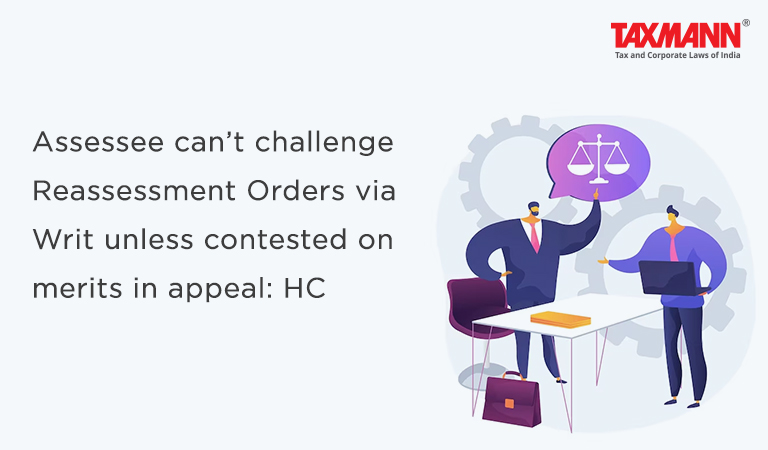Assessee can’t challenge Reassessment Orders via Writ unless contested on merits in appeal: HC
- Blog|News|Income Tax|
- 2 Min Read
- By Taxmann
- |
- Last Updated on 15 March, 2023

Case Details: Gopal Tukaram Bitode v. Income-tax officer - [2023] 147 taxmann.com 450 (Bombay)
Judiciary and Counsel Details
-
- A.S. Chandurkar & Urmila Joshi-Phalke, JJ.
- Ram D. Heda, Adv. for the Petitioner.
- Anand Parchure, Adv. for the Respondent.
Facts of the Case
A search was carried out in a co-operative credit society. During the search operation, it was found that the assessee had deposited certain amount in his account held with the co-operative society during the relevant assessment year. The Assessing Officer (AO), while believing that the income chargeable to tax has escaped, issued notice under section 148 after obtaining necessary approvals.
In response, the assessee failed to explain the source of cash deposit, an assessment order was passed, and consequently, the penalty was levied under section 271(1)(c).
Aggrieved by the order, contending that the jurisdiction falls within section 153C, the assessee preferred a writ petition to the Bombay High Court.
High Court Held
The Tribunal held that the assessee chose not to contest the jurisdiction of reopening the assessment under section 153C. By responding and contesting the notice, the assessee allowed the assessment orders to be passed.
If the assessee had challenged the notice issued when it was issued, it would have made a difference. However, the assessee allowed the authorities to proceed under section 147 by responding to the notice. After the assessment orders have been passed, it is only now that the argument is being made that the reopening was not within jurisdiction.
There can be no dispute with the proposition that if the impugned exercise is without jurisdiction, extra-ordinary jurisdiction under article 226 of the Constitution of India could be invoked. However when an efficacious statutory remedy of appeal was available, jurisdiction under article 226 could not be invoked.
List of Cases Referred to
-
- Magadh Sugar & Energy Ltd. v. State of Bihar 2021 (6) BLJ 356 (SC) (para 5)
- Kanwar Singh Saini v. High Court of Delhi 2011 (10) SCALE 725 (para 5)
- Asstt. CIT v. Hotel Blue Moon [2010] 188 Taxman 113/321 ITR 362 (SC) (para 5)
- CIT v. Laxman Das Khandelwal [2019] 108 taxmann.com 183/266 Taxman 171/417 ITR 325 (SC) (para 5)
- Indus Towers Ltd. v. Dy. CIT [2017] 82 taxmann.com 430 (Delhi) (para 5)
- Pr. CIT v. Shri Jai Shiv Shankar Traders (P.) Ltd. [2015] 64 Taxman 220/[2016] 383 ITR 448 (Delhi) (para 5)
- Murli Industries Ltd. v. Asstt. CIT [W.P. No. 2948 of 2021, dated 23-12-2021] (para 5)
- Heval Navinbhai Patel v. ITO [2021] 126 taxmann.com 82/279 Taxman 24 (Guj.) (para 5)
- State of Maharashtra v. Greatship (India) Ltd. [2022] 142 taxmann.com 417 (SC) (para 6)
- Ramnivas Satyanarayan Dodiya v. National Faceless Assessment Centre [W.P. No. 4714 of 2022, dated 2-5-2022] (para 10)
Disclaimer: The content/information published on the website is only for general information of the user and shall not be construed as legal advice. While the Taxmann has exercised reasonable efforts to ensure the veracity of information/content published, Taxmann shall be under no liability in any manner whatsoever for incorrect information, if any.

Taxmann Publications has a dedicated in-house Research & Editorial Team. This team consists of a team of Chartered Accountants, Company Secretaries, and Lawyers. This team works under the guidance and supervision of editor-in-chief Mr Rakesh Bhargava.
The Research and Editorial Team is responsible for developing reliable and accurate content for the readers. The team follows the six-sigma approach to achieve the benchmark of zero error in its publications and research platforms. The team ensures that the following publication guidelines are thoroughly followed while developing the content:
- The statutory material is obtained only from the authorized and reliable sources
- All the latest developments in the judicial and legislative fields are covered
- Prepare the analytical write-ups on current, controversial, and important issues to help the readers to understand the concept and its implications
- Every content published by Taxmann is complete, accurate and lucid
- All evidence-based statements are supported with proper reference to Section, Circular No., Notification No. or citations
- The golden rules of grammar, style and consistency are thoroughly followed
- Font and size that’s easy to read and remain consistent across all imprint and digital publications are applied



 CA | CS | CMA
CA | CS | CMA
